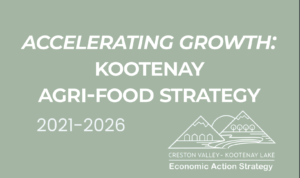 “Agriculture is the heart of the CV-KL area economy. The sector is a major employer; a source of pride, innovation and differentiation; and the fields and farms provide a unique feel that residents and visitors love.” Pg. 49 - Pillar 3 is Agriculture - Stronger Together, CV-KL Economic Development Strategy
“Agriculture is the heart of the CV-KL area economy. The sector is a major employer; a source of pride, innovation and differentiation; and the fields and farms provide a unique feel that residents and visitors love.” Pg. 49 - Pillar 3 is Agriculture - Stronger Together, CV-KL Economic Development Strategy
The CRESTON VALLEY- KOOTENAY LAKE: REGIONAL AGRIFOOD STRATEGY: ACCELERATING GROWTH 2020/21 project is about creating a strong, interconnected agrifood industry in the Creston Valley that extends throughout the Columbia Basin. Threatened by wildfires, droughts and the pandemic, this key sector requires immediate action to ensure its continued viability. Reduced transportation and cross border activity indicate a strong demand for a more sovereign food security system and the opportunities in value added agriculture.
Recognizing this, the strategy recommends leveraging existing program infrastructure, namely the Kootenay Farms Food Hub, to champion the Creston Valley as the commercial hub of the region by building a business innovation ecosystem that incubates and accelerates agri-food businesses across the entire Columbia basin. It assessed the opportunities available for the farmers in the region.
This project coordinates leadership and builds and strengthens the Agrifood network within the region. Food processing represents a significant opportunity for growers to expand their market reach; locally, provincially, nationally and beyond. It is emerging as an essential step to increase revenue potential and reduce agricultural waste. A Columbia Basin Regional Food Processing Survey was conducted to assess the market for food hub services in the Columbia Basin and the potential for commercial expansion. The development of the Food Hub supplies the infrastructure for local homemakers and larger producers alike to extend food processing capacity, accessing a Certified Kitchen and professional equipment to increase value of the product.
The ten highest impact results of the Agri-food strategy were:
- Investment readiness for an agrifood processing facility
- Broad community consensus on agri-food as the top ec dev priority including local, regional provincial and federal representation
- Engagement with sector stakeholders from across the entire Columbia Basin in collaboration with basin-wide partners
- Facilitation of industry networking led by local partners ie. Fields Forward and provincial ministry leads
- Mobilization of immediate economic response to COVID-19
- Development, launch and management of a migrant worker camp to ensure safe migration of workers needed in the agri-food sector
- Training of industry leaders in emerging regulatory requirements and best practices in on-farm accommodations
- Development and coordination of mobile vaccination program to improve on-farm worker vaccination rates
- Secured $500,000 to support establishment of a local food hub based on quantifiable market needs
- Conducted important sector studies including
- 1) Opportunity Assessment to combine the Food Hub with a Tourism Center examining
potential locations that could be used to foster agritourism through colocation, - 2) A Cherry Powder Feasibility Study to determine the feasibility of cherry powder mass as a new value added process to reduce waste and diversify revenue streams.
- 1) Opportunity Assessment to combine the Food Hub with a Tourism Center examining
Although this strategy is designed for the unique positioning of the Creston-Valley Kootenay Lake area, it reiterates the importance of networking and fostering collaboration within the ecosystem in order to develop self-sufficient local and regional food systems. While strategies should reflect that each region and community is unique in social capital and resources, the underlying methodology in this project provides the foundation for building the knowledge base necessary to tailor strategy appropriately to other communities.
The key lesson to be learned is that the strategy development process itself is a perfect time to accomplish quick wins and build the capacity of the ecosystem by taking direct action. This leads to a strategy that is battle tested and based on nuanced understanding that can only be derived from lived experience.